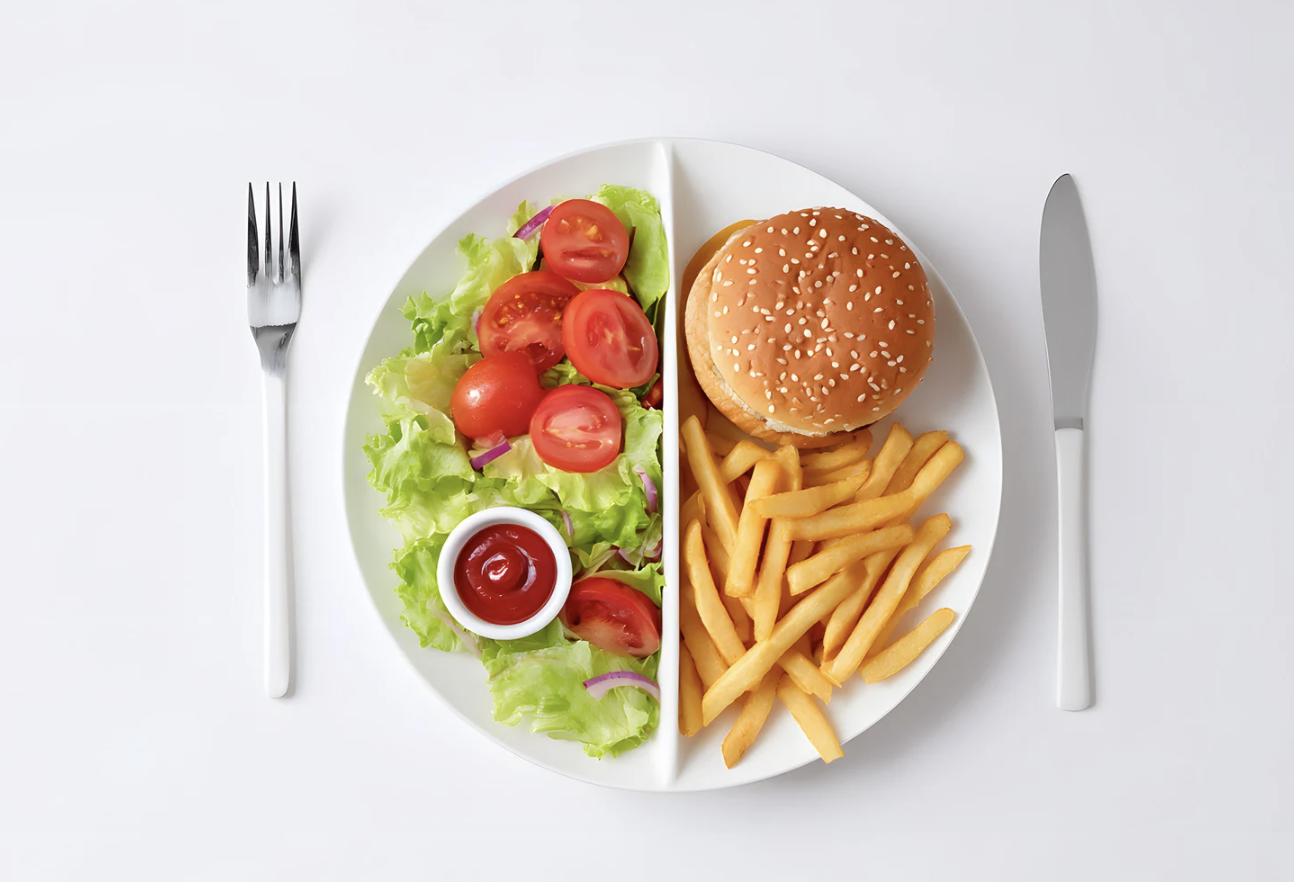Listen on: Apple Podcasts | Spotify | Amazon Music | Podcast Index | Overcast | YouTube
Do you find yourself reaching for a second helping even when you’ve eaten quite a few calories? Or struggling to cut back on calories, only to feel constantly unsatisfied? You’re not alone—and it turns out that how much we eat is heavily influenced by what we eat. I’ve personally seen this play out in my own life and at my dinner table with my wife, Gail, who recently started cutting out flour and sugar while upping her vegetable intake. Her take? She’s fuller, longer. And for me, starting with a bit of protein before a meal seems to turn down the dial on hunger. So, I dug into the research. What does the science say?
Let’s explore five key factors that influence satiety—and how you can use them to your advantage.
1. Calorie Density: Not All Bites Are Created Equal
Imagine the difference between a handful of celery and a slice of cheesecake. The first fills your stomach with minimal calories; the second packs in hundreds. That’s calorie density—how many calories are packed into each bite.
In a randomized controlled trial using a crossover design, researchers compared meals of differing calorie densities in 69 individuals with healthy BMIs. Those who ate higher-calorie-dense meals (using full-fat ingredients like regular mayo and darker chicken meat) ended up consuming an additional 484 calories compared to those given a lower-calorie-dense version of the same meal (source).
The takeaway? Choosing foods that are bulky but lower in calories—like vegetables, whole grains, and legumes—can help you feel satisfied without overdoing it.
2. Texture: The Power of the Chew
Texture matters more than you think. A study in 50 healthy young adults compared soft versus hard meals—think mashed potatoes versus multigrain rice with raw veggies. The result? Participants ate 20% more calories and food by weight with the softer-textured meal (study).
Another favorite of mine is the apple study. Participants were given either a whole apple, applesauce, or apple juice before a meal. Those who ate the apple ended up consuming 187 fewer calories than those who had juice (study)—despite all options having the same calorie content. The fiber and chewing likely played a major role in satiety.
3. Protein: Nature’s Hunger Suppressant
Protein tends to have a unique ability to keep us full. In one small study of 11 men, participants who had a high-protein snack postponed their next meal by 60 minutes, compared to just 34 minutes for high-carb snacks and 25 minutes for high-fat ones (source).
From personal experience, a small protein-rich bite 15–20 minutes before a meal helps me curb my appetite significantly—and this research supports that approach.
4. Water: Simple and Effective
A glass of water before a meal may go further than just hydrating you. In one randomized study, drinking water before eating made participants feel fuller and eat less (study).
Looking at longer-term effects, a systematic review found that consuming 500 ml of water before meals, over 3 to 12 months, led to significant weight loss across multiple randomized trials (JAMA Network).
5. Mind Over Meal: What You Think You’re Eating Matters
One of my favorite studies in this space is the “sham milkshake” experiment. Participants drank identical 380-calorie milkshakes but were told they were either “indulgent” (620 calories) or “light” (140 calories). Those who believed they were consuming the higher-calorie shake reported greater satiety—and their hunger hormone levels (ghrelin) matched their beliefs, not the actual nutritional content (Stanford study).
Your perception plays a role in how full you feel—something to keep in mind the next time you’re reaching for seconds.
Practical Takeaways and a Simple Self-Experiment
The evidence isn’t perfect—most studies are small, and many use healthy-weight individuals as subjects. But the trends are compelling enough to justify trying these strategies in your own life. As I often say, it’s time to run an N-of-1 trial (see Episode 27 for a full walkthrough). Here’s what to try:
- Start your meal with a small protein snack.
- Drink a glass of water before eating.
- Choose foods that require more chewing and are less calorie-dense.
- When possible, eat whole foods (like apples) over processed versions (like juice).
- Be mindful of how you frame your food—your expectations can influence your satisfaction.
Final Thoughts
Hunger isn’t just about willpower. It’s a complex interplay of biology, perception, and behavior. But with just a few strategic shifts in what you eat and how you eat it, you can make satiety your ally. The goal isn’t to feel deprived—it’s to feel satisfied, nourished, and in control.
Want to go deeper on how to make wellness feel manageable? I’ll be hosting a free live workshop on Thursday, October 2nd at 6pm Central, where I’ll walk you through how to prioritize your health without making it a full-time job. Sign up here, and feel free to share with anyone else looking to live long and well.
Until next time—be kind to yourself, fuel up with intention, and stay curious.

Scientific research underscores the intricate interplay between lifestyle factors and human health. Exercise, a cornerstone of well-being, enhances cardiovascular health, boosts mood, and promotes cognitive function. Coupled with proper nutrition, it fosters optimal physical performance and supports immune function. Beyond the individual, social ties exert profound effects on health, buffering against stress and enhancing longevity. Meanwhile, exposure to hot and cold environments elicits physiological adaptations, bolstering resilience and metabolic efficiency. Adequate sleep, essential for cognitive consolidation and metabolic regulation, underscores the importance of restorative rest. Moreover, the mind-body harmony underscores the intricate relationship between mental and physical health, highlighting the profound impact of mindfulness and stress management on overall well-being. Integrating these factors into daily life cultivates a holistic approach to health promotion and disease prevention.